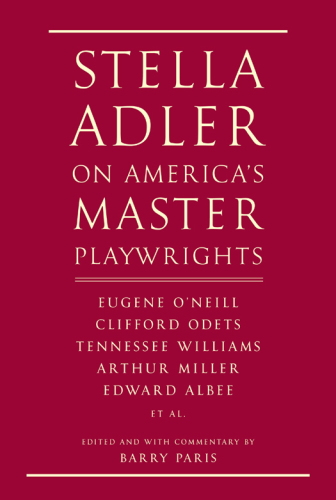
Stella Adler on America's Master Playwrights
Eugene O'Neill, Clifford Odets, Tennessee Williams, Arthur Miller, Edward Albee, et al.
کتاب های مرتبط
- اطلاعات
- نقد و بررسی
- دیدگاه کاربران
نقد و بررسی

May 28, 2012
Culled from the voluminous lectures of the late American actress, Group Theatre cofounder, and renowned teacher, this companion volume to Stella Adler on Strindberg, Ibsen, and Chekhov (2000) shares the same forceful qualities and inescapable drawbacks of the earlier selection, but will be essential reading for the actor as well as a bracingly original introduction (or refresher) for the general reader. Beginning with a discussion of O’Neill, Adler establishes key themes, including an explication of the marginality that produces great theater and its implicit challenge to the mainstream convictions of its audience. She then moves through playwrights who were defined by, and in turn transcended, their particular eras. With respect to the Great Depression, for example, there’s a keen, stimulating consideration of Thornton Wilder (along with William Saroyan, discussed in a later chapter) as a Chekhovian writer of enormous, universalizing humor, paradoxically cosmopolitan and thoroughly (ambivalently) American. Although editor Paris (Louise Brooks: A Biography) takes pains to reduce the natural redundancy across these talks (in addition to offering synopses of the plays discussed and judicious explanatory footnotes), the transfer to the page inevitably entails compromise; chapters land somewhere between transcripts and cohesive essays. Nevertheless, nearly every page shimmers with Adler’s bounding personality and discerning grasp of her subjects.

Starred review from June 1, 2012
Brilliant lectures on the American masters from the late, legendary acting teacher. The indomitable Stella Adler (1901-1992), who tutored Marlon Brando, displays both her omnivorous intellect and decades of experience in this generous second volume of acting-class lectures (following Stella Adler on Ibsen, Strindberg and Chekhov, 1999) edited by celebrity biographer Paris (Garbo, 2002, etc.). Here, the teacher covers Eugene O'Neill, Thornton Wilder, Clifford Odets, William Saroyan, Tennessee Williams, William Inge, Arthur Miller and Edward Albee. Adler knew the play, she knew the writer, and her message to her actors was direct: You must understand the play and the playwright at both the macro and micro level. You can't do O'Neill if you don't know about his tormented Irish-Catholic background; you can't perform A Streetcar Named Desire or Death of a Salesman if you don't know about postwar alienation. "If you don't use the play's world, you are not an actor, because the play is taken from that world, not yours, and you have to go there to find it." Also, you must know the character's inner and outer life: "Does he have an accent? How does he dress, how does he wear his hair? ...What are the circumstances he lives in?" In Beyond the Horizon, Robert is weak, but don't play him weak; he thinks he is strong. In Mourning Becomes Electra, play Christine like a queen; "use your epic voice, not a little intimate voice." In The Glass Menagerie, Laura wears a leg brace; when she sits on the floor with her gentleman caller, she's in pain. Read between the lines; follow what's said and what isn't. Adler has another, subtler message for her actors: Stay true to your art. An exciting, inspiring and essential book for anyone interested in American theater.
COPYRIGHT(2012) Kirkus Reviews, ALL RIGHTS RESERVED.

























دیدگاه کاربران